"Bacon-licious"
September 23, 2010 - Volume 1, Issue 18
|
|
|


Next Issue: Oct 7, 2010
"Fast, Easy and Slow"
|
|
|
Bringing Home the Bacon
| 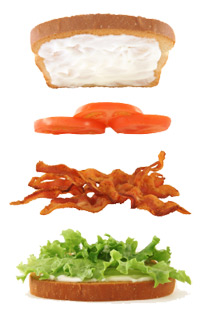 Bacon is nearly irresistible! It shows up at the breakfast table, at
lunchtime, and on the dinner plate. The salty, sweet, smoky taste of
bacon is beguiling. We're just concluding our annual obsession with
BLT's -- you know, the best kind with real tomatoes still warm from the
sun, bacon fried to crispy, golden perfection, crunchy lettuce, a smear
of mayonnaise, all sandwiched between lightly toasted slices of bread.
Whether the dominant feature of the meal, or a key flavor accent, bacon
rules! Bacon is nearly irresistible! It shows up at the breakfast table, at
lunchtime, and on the dinner plate. The salty, sweet, smoky taste of
bacon is beguiling. We're just concluding our annual obsession with
BLT's -- you know, the best kind with real tomatoes still warm from the
sun, bacon fried to crispy, golden perfection, crunchy lettuce, a smear
of mayonnaise, all sandwiched between lightly toasted slices of bread.
Whether the dominant feature of the meal, or a key flavor accent, bacon
rules!
IN THIS ISSUE,we discover just what bacon is, and explain the differences between
types of bacon. Next, we offer our best advice for making perfect bacon
at home, and answer some of your questions. We finish with three recipes
from The Bacon Cookbook - a recipe for breakfast, another for lunch,
and one for a hearty, comfort food supper - all with bacon!
|
|
|
|
Cooking Classes at Love to Cook!
|
We have a great line-up of
classes underway! It's a great way to spend an evening or day! We
look forward to having you in our kitchen soon! Cooking classes make a great date night too! Get all of the details on our website's Cooking Class page or Click the Class Titles below.
Friday, September 24 - Perfect Under Pressure: Electric Pressure Cooking - 6:30 p.m.- Couldn't we all use a little more time in the day? In this class our Resident Chef, JaDene Denniston,
will show how to increase your efficiency in the kitchen with the most
under-rated kitchen appliance: the pressure cooker. Learn to save
time, energy, and money using this wonderful machine.  Saturday, September 25 - Covered in Caramel- 11:00 a.m.- Everything
is better when coated in a thick layer of chewy, buttery caramel
right? We think so too. In this class, Lindsey Owens will share
delicious recipes that you will be thrilled to sink your teeth into.
Just in time for the fall season, get these great recipes to share with
your family, friends, and neighbors. Saturday, September 25 - Covered in Caramel- 11:00 a.m.- Everything
is better when coated in a thick layer of chewy, buttery caramel
right? We think so too. In this class, Lindsey Owens will share
delicious recipes that you will be thrilled to sink your teeth into.
Just in time for the fall season, get these great recipes to share with
your family, friends, and neighbors.
Tuesday, September 28 - Classic Italiano - 6:30 p.m.- Everybody
loves to eat Italian food on a cold night. Pierre Micheli, from Le
Nonne restaurant, will share delicious authentic recipes straight from
his native Italy. Don't miss out on this wonderful class! Thursday, September 30 - Cooking Fundamentals: Homemade Stocks & Sauces - 6:30 p.m.-
Cooking Fundamentals: Homemade Stocks & SaucesHomemade stocks & sauces can make all the difference in your food. In this class, Resident Chef, JaDene Denniston will
share how to master these basic fundamentals and how to make them ahead
and store them. Your soups will never be the same!Saturday, October 2 - Sinful Chocolate Baking - 11:00 a.m.- Baking
is such an essential part of the holiday experience. The smell of
chocolate wafting through the house as it bakes in the oven is something
we're all familiar with. Kezia Whitteker
has three of the ultimate sinful chocolate recipes plus all the tips
& tricks you need to turn your home into a chocolate bakery! You'll
even be able to take on the seemingly daunting task of perfecting
the warm, gooey center to a molten lava cake. Yum! Tuesday, October 5 - Edible Holiday Creations - 6:30 p.m.- Pastry
Chef for Elements Restaurant, Heather Troyer is a master at making
edible characters. Whether it's to take impressive treats to a child's
school party, create name cards or a centerpiece on the Thanksgiving
table, or create edible holiday gifts for friends & family, you
don't want to miss this class. Heather will be making tons of cute
treats out of cookies, brownies, cupcakes, & more. The whole family
will be sure to enjoy making these year after year. Wednesday, October 6 - Hands On Whole Wheat Bread - 1:00 p.m.- Come
learn from our in-store instructor how to make delicious wheat bread
using freshly ground wheat flour. Instructor will also demonstrate how
to make our cinnamon/currant variation. Includes pan and one loaf of
bread to take home. Thursday, October 7 - Simple & Sensational One Pot Meals - 6:30 p.m.- A
simple one pot meal makes the perfect weeknight dinner. Annette
Blackburn has the perfect recipes that will become go-to dinners for
sure. These hearty meals take care of the main course and any sides and
are quick & easy to get onto the table. What more could you ask
for? Saturday, October 9 - Chocolate Workshop - 11:00 a.m.- We
all want to make impressive dipped chocolates & candies for the
holidays but so many of us have problems getting the chocolate right. Ruth Kendrick has
mastered the art of chocolate and will be passing along her knowledge,
tips & tricks for success. Understand the basic principles of
chocolate including ganache, tempering, & dipping. You won't be
sorry you came! Tuesday, October 12 - Do The Math: One Pork Loin, Five Dinners -6:30 p.m- It is so affordable to buy meat in bulk. In this class, Janice Skousen
has a meal plan that will be simple & economical. By purchasing
one large pork loin and preparing it in five different ways, you'll have
delicious meals that are easy on the wallet and the cook. |
What is Bacon?
| Bacon, a highly seductive meat, originates from a cut of pork from
either the side, belly, or back of the pig. These portions of the pig's
anatomy have layers of fat and muscle intertwined; slices, cut as a
cross-section, reveal bacon's alternating lean and fatty character.
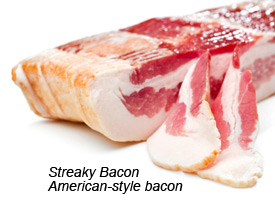 Bacon - Made Salty and Smoky- A dietary staple for centuries, bacon is still salt-cured. The curing
is an essential process for the pork's preservation where freshly cut
slabs are soaked in a brine, or dry-cured by packing in salt. Salt
curing makes the environment inhospitable for bacteria that would
otherwise spoil the meat. Today's salt-curing processes use less salt
than in the past, and place greater reliance on packaging and
refrigeration. Smoking bacon also originated as a method for
preservation. Smoking may occur at low temperatures or high
temperatures. Bacon is optionally smoked, but all bacon is salt-cured. Bacon - Made Salty and Smoky- A dietary staple for centuries, bacon is still salt-cured. The curing
is an essential process for the pork's preservation where freshly cut
slabs are soaked in a brine, or dry-cured by packing in salt. Salt
curing makes the environment inhospitable for bacteria that would
otherwise spoil the meat. Today's salt-curing processes use less salt
than in the past, and place greater reliance on packaging and
refrigeration. Smoking bacon also originated as a method for
preservation. Smoking may occur at low temperatures or high
temperatures. Bacon is optionally smoked, but all bacon is salt-cured.
Types of Bacon- Bacon comes in several different forms based on the cut of pork, type
of salt curing, optional smoking, and different aging techniques. Here
are some common bacon terms:
Streaky Bacon
- A term for bacon made from pork belly and most commonly thought of as
common, American-style bacon; the slices have alternating "streaks" of
lean and fat. 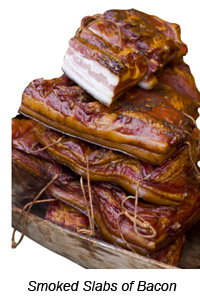 Slab Bacon Slab Bacon- Unsliced, a slab of bacon is a solid chunk and often has the rind
still present on one side. A slab of bacon is a useful purchase when a
small dice or chunks of bacon are desired for a recipe. Canadian Bacon- This style of bacon uses the much leaner, loin portion of the pig's
back. Canadian bacon is cured, smoked, and fully cooked. In many
respects, it has a character closer to ham than bacon. Rasher - Rasher is another word for a slice of bacon and is a term more frequently used in the UK. Pancetta- Italian in origin, pancetta is unsmoked pork belly cured with salt
and spices, then aged for about 12 weeks. The meat is often rolled, and
is typically sliced very thinly. Prosciutto - Also Italian in origin, prosciutto is actually a ham that is dry-cured and aged. It is served, uncooked, in very thin slices. Speck- Another pork product from Italy and Austria, speck is salt-cured,
smoked, and very highly seasoned. It, too, is served in very thin
slices. Guanciale - This form of bacon is made from pork jowl. It is a dry-cured Italian meat that is gaining in popularity.
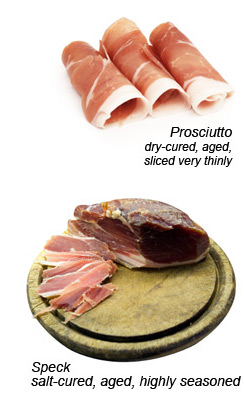 Trends in Artisanal Bacon- Bacon has experienced a renaissance in popularity occasionally
reaching cult status. Differences in bacon start with the breed of the
pig and what the pig is fed during its growth period. For example, a pig
fed a diet with acorns produces a meat described as "creamy." The meat
may be processed with different types of salts possessing unique
qualities. Different woods used in smoking produce different flavors in
the bacon. The most popular smoking woods for bacon are hickory and
applewood. Some bacon features brown sugar or maple syrup for added
sweetness. Trends in Artisanal Bacon- Bacon has experienced a renaissance in popularity occasionally
reaching cult status. Differences in bacon start with the breed of the
pig and what the pig is fed during its growth period. For example, a pig
fed a diet with acorns produces a meat described as "creamy." The meat
may be processed with different types of salts possessing unique
qualities. Different woods used in smoking produce different flavors in
the bacon. The most popular smoking woods for bacon are hickory and
applewood. Some bacon features brown sugar or maple syrup for added
sweetness.
Crazy over Bacon- Devotees of bacon can join "Bacon of the Month" Clubs, or enjoy bacon
with its partner, mayonnaise as "baconnaise." Bacon has long been
enjoyed in a peanut butter sandwich, and now commonly finds itself
paired with chocolate. The truly bewitched can obtain bacon-flavored
jellybeans, bacon band-aids, bacon dental floss, and even bacon air
freshener.
The Skinny on Bacon Fat- Surprisingly, bacon has less saturated fat per gram of fat than
butter. But, let's face it, bacon is not a health food. A steady diet of
bacon would not please our health care team. But, in MODERATION, bacon
may have a role at our tables. For example, bacon crumbles add a lot to a
dish as a flavor accent and allows us full flavor and moderation at the
same time.
|
Preparing Perfect Bacon
| We've outsourced a lot of bacon preparation to the convenience of
pre-cooked bacon, pre-crumbled bits, or bacon-topped fast-food burgers,
all in the name of reducing the hassle-factor. However, in this pursuit
of fast and easy, we've lost a huge amount of flavor in the translation.
Freshly made bacon is delicious! Here's how:
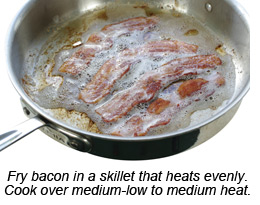 Frying- When cooking just a few strips of bacon, frying is quick and easy.
Place the bacon slices in a cold skillet and apply medium-low to medium
heat. Beginning with a cold skillet allows some of the bacon's fat to
liquefy and reduces sticking. Turn the bacon while frying and move to
different sections of the skillet to evenly cook the slices. Pan-frying
will take about 12-15 minutes depending the thickness of the bacon. The
best advice for pan-frying bacon is to keep the heat low and watch
carefully. Drain cooked slices on a plate lined with paper towels. Blot
the strips with a paper towel to remove any excess bacon fat. Frying- When cooking just a few strips of bacon, frying is quick and easy.
Place the bacon slices in a cold skillet and apply medium-low to medium
heat. Beginning with a cold skillet allows some of the bacon's fat to
liquefy and reduces sticking. Turn the bacon while frying and move to
different sections of the skillet to evenly cook the slices. Pan-frying
will take about 12-15 minutes depending the thickness of the bacon. The
best advice for pan-frying bacon is to keep the heat low and watch
carefully. Drain cooked slices on a plate lined with paper towels. Blot
the strips with a paper towel to remove any excess bacon fat.
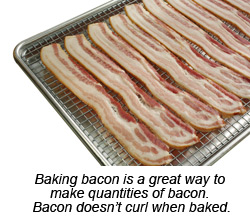
Baking- An increasingly popular method for cooking bacon, baking is a great
method for cooking an entire pound or more of bacon. Line a jellyroll
pan (20" x 14"), or any baking pan with an adequate rim, with aluminum
foil. Place the bacon strips in a single layer and place in a cold oven.
Turn the oven on to 400°F and bake for 12-17 minutes. Baking time will
vary based on the thickness of the slices. Transfer baked slices to a
plate lined with paper towels. Blot excess fat away with a paper towel.
Alternately, bake bacon on a rack inserted into the jellyroll pan to
drain the fat away during baking.
Broiling - This method cooks
from the top down. Preheat the broiler and place the oven's rack so that
the bacon is about 3 inches from the heat source. Place the bacon on a
broiling rack that lies inside a catch pan. Broil the bacon for about
6-7 minutes depending on the thickness of the bacon slices.
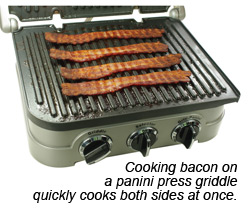 Panini Griddle- A panini griddle or any grill press cooks bacon quickly from both the
top and the bottom keeping the bacon flat while cooking. Place the
bacon on the bottom half of a cold griddle. Set the dial on medium heat
and lower the top griddle. The grilling bacon will produce a prodigious
amount of grease - make sure to have an adequate grease catcher at the
grill's drain point. Panini Griddle- A panini griddle or any grill press cooks bacon quickly from both the
top and the bottom keeping the bacon flat while cooking. Place the
bacon on the bottom half of a cold griddle. Set the dial on medium heat
and lower the top griddle. The grilling bacon will produce a prodigious
amount of grease - make sure to have an adequate grease catcher at the
grill's drain point.
Deep Frying - As long as bacon
is on the menu, doubling-down with deep-frying it seems only a small
step further down the decadence pathway. Coat thin slices of bacon in
flour, or a light tempura-like batter, and fry in a skillet with a
quarter to half-inch of oil.
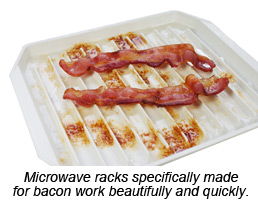 Microwaving- On a microwave-safe plate lined with paper towels, place the bacon
strips. Cover the strips with a single layer of paper towels to reduce
spattering. Microwave on high for 5-7 minutes turning the plate a
quarter turn halfway through the cooking if not on an automatic
turntable. Try microwave safe bacon racks designed to drain fat while
cooking. Microwaving- On a microwave-safe plate lined with paper towels, place the bacon
strips. Cover the strips with a single layer of paper towels to reduce
spattering. Microwave on high for 5-7 minutes turning the plate a
quarter turn halfway through the cooking if not on an automatic
turntable. Try microwave safe bacon racks designed to drain fat while
cooking.
Storing Bacon -Store bacon in the colder section of the refrigerator. Check the
packaging for the "Best Used By Date." Once opened, the bacon should be
used within a week. Uncooked bacon may be frozen with best results when
used within a month.
|
Smart Bacon Tips
| Tip #1: Use bacon as a natural
baster on lean meats or poultry. As the meat roasts, the bacon's fat and
flavor seep in keeping everything moist and juicy. This culinary
technique of wrapping meat with strips of fat is known as barding.
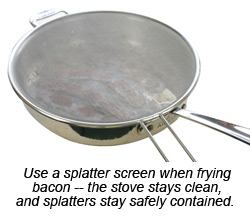 Tip #2: Bacon has a notorious reputation for splattering and popping while
cooking. Use a splatter screen to keep the stove cleaner and to reduce
the chance of a splatter burn. A side benefit, a splatter screen reduces
bacon-cooking odors that sometimes hang in the kitchen. Tip #2: Bacon has a notorious reputation for splattering and popping while
cooking. Use a splatter screen to keep the stove cleaner and to reduce
the chance of a splatter burn. A side benefit, a splatter screen reduces
bacon-cooking odors that sometimes hang in the kitchen.
Tip #3: Freshen pre-cooked bacon or real bacon bits with 10-15 seconds in the microwave.
Tip #4: Sliced bacon comes in different thicknesses. Thinly sliced bacon has
about 28-32 slices per pound and is sometimes known as "restaurant
slice." Regular, sliced bacon has 16-20 slices per pound, and
thick-sliced bacon has 10-14 slices per pound.
Tip #5: While transferring bacon slices from its packaging, take care not to
stretch the slices. Retaining even thickness of the slice during
handling will allow for more even cooking.
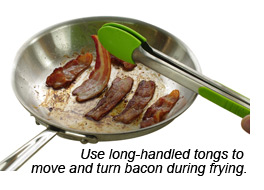 Tip #6: Use tongs to turn and
handle the cooking bacon strips. Tongs provide a good grip, and the
longer handles keep splatters further away from the hand. Tip #6: Use tongs to turn and
handle the cooking bacon strips. Tongs provide a good grip, and the
longer handles keep splatters further away from the hand.
Tip #7: Bacon Salt is a product that adds bacon flavor to anything that it is
sprinkled on. Made without any pork, and sporting a 100% kosher label,
this product brings great bacon flavor to non-pork eaters.
Tip #8: Mark your calendars: International Bacon Day is always observed the Saturday of Labor Day Weekend.
|
Q & A's
|  Q: Why is bacon always packaged in shingled slices with a window on the back? Q: Why is bacon always packaged in shingled slices with a window on the back?
A: An immigrant from Bavaria, Oscar Mayer, started this bacon-packaging
norm and patented it in 1924. The packaging highlighted the new-fangled
notion of "pre-sliced" bacon. The backside window helps consumers assess
the balance of lean and fat in the cut.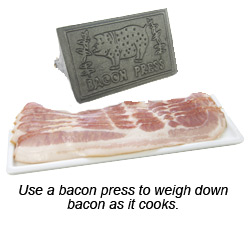
Q: Why does bacon curl up while cooking?
A: Proteins in the lean parts of the bacon shrink faster than the fatty
portions in the presence of heat; the result is bacon that curls. Use a
bacon press to forcibly hold the bacon strips flat while cooking.
Alternately, a two-sided griddle or panini press cooks from the bottom
and the top while keeping each slice relatively flat.
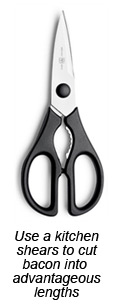 Q: What should I do with all of the leftover bacon grease? Q: What should I do with all of the leftover bacon grease?
A: Once was the day when every stovetop had a tin can or container to
capture bacon or other cooking fat. The fat was reused in future cooking
sessions. Our cooking has shifted to healthier cooking fats like olive
oil. After cooking bacon, allow the grease to cool, scrape solidified
grease into the landfill garbage, or absorb the grease with paper
towels. Bacon grease is not suitable for composting, and DEFINITELY not
suitable for pouring down the garbage disposal - the grease solidifies
at cool temperatures and will efficiently clog your pipes.
Q: Long bacon strips don't fit well in my pans, and don't cook evenly. Suggestions?
A: Use your kitchen shears to cut strips of bacon in half or thirds. The
smaller pieces can be moved around the pan easily and allows each piece
to cook more evenly.
|
| Cookbook Review | 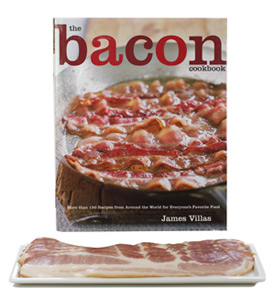 The Bacon Cookbook by James Villas. Published by John Wiley & Sons, Hoboken, NJ. Copyright 2007. The Bacon Cookbook by James Villas. Published by John Wiley & Sons, Hoboken, NJ. Copyright 2007.
Bacon
is a popular food! We had our choice between three(!) recent cookbooks
all singularly devoted to bacon. We chose to feature this particular
cookbook because of the range of recipes - from all the classics to some
creative dishes. The recipes respect the role of bacon as a flavor
accent in addition to being a primary focus. James Villas, a well-known
cookbook author, brings his writing and recipe presentation skills to
this book as well. Ingredient lists are simple, accessible, and
instructions that are clear and easy to follow. Beautiful,
mouth-watering photography graces many of the book's pages. The book is
organized into logical chapters beginning with appetizers, breakfast
dishes, soups, salads, casseroles, entrees, vegetables, pasta and rice,
breads, and even desserts. It's a bacon lover's dream - every recipe
contains bacon!
|
Bacon Recipes for Breakfast, Lunch & Dinner
| New England Apple and Bacon Griddlecakes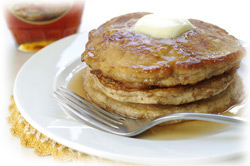
View & Print
Definitely,
these are not your everyday pancakes! Absolutely loaded with apples and
bacon crumbles, the pancakes accepted the maple syrup and butter just
like a regular pancake, but the taste is anything but ordinary. The only
thing that might have made this breakfast better would have been a
couple of crispy slices on the side.
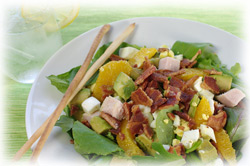 Chicken, Avocado, and Orange Salad Chicken, Avocado, and Orange Salad
with Bacon Dressing
View & Print
After
a summer with many great salads, we voted this one of our very
favorites! This main course salad combines two types of meat, three
types of greens, creamy avocado chunks, and sweet orange sections. Bacon
grease forms the basis of a very flavorful dressing. It's a rich and
satisfying meal.
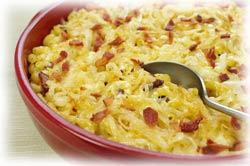 Swiss Macaroni, Bacon, and Cheese Swiss Macaroni, Bacon, and Cheese
View & Print
This
pasta casserole features Gruyère cheese and plenty of bacon pieces.
Unlike a mac 'n cheese based on some type of white sauce, this pasta
dish turns out a lighter version with greater focus on the pasta and
cheese, and of course, the bacon pieces. The dish is quick to assemble
and produces a very satisfying meal.
Recipes from The Bacon Cookbookby James Villas. Published by John Wiley & Sons, Hoboken, NJ.
Copyright 2007. Reprinted with permission of the publisher. All rights
reserved.
|
|
Go hog wild and enjoy a little bacon!
|
Chris Beykirch and All the Staff at Love to Cook! 1211 N. Main Street Logan, UT 84341 435-752-9220/888-GADGET9 www.luvtocook.com |
|
|
|
|